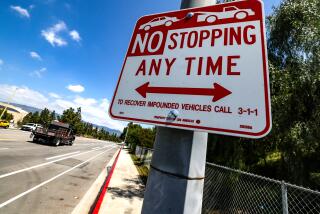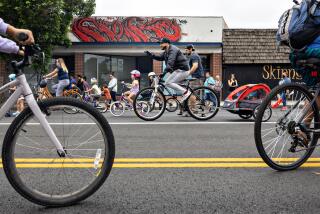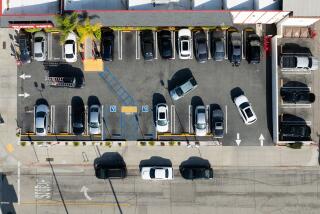Swept up in parking ticket mania
A bleary-eyed Chui Hom tripped down her apartment stairs at 8 a.m. sharp and started her car.
She didn’t get far. The vehicle inched across Riverside Terrace, a narrow one-way lane in Echo Park, and stopped on the other side.
Hom is part of Los Angeles’ Great Street-Sweeping Do-Si-Do. Twice a week, residents of Koreatown, Pico-Union and other neighborhoods with more apartments than parking spaces race to their cars, hoping to move them before parking enforcement officers arrive and ticket them for blocking street sweepers.
“It’s such an annoying thing,” said Hom, a 54-year-old county office worker. As she spoke, several other women in dishabille stumbled down the stairs. “It’s really become problematic.”
Hom has no choice but to play early morning “musical cars” before the lumbering yellow trucks arrive to clear the gutters. She could move her car to Riverside Drive, but parking there was prohibited from 2 a.m. to 6 a.m. to get rid of homeless people sleeping in their vans and trailers.
Thousands of other Angelenos just take their lumps when half their street parking suddenly vanishes. Emilio Driscoll, 23, an Iraq veteran and college student, has gotten five or six street sweeping tickets since he moved to East Hollywood seven months ago, including two he has yet to pay.
“I admit there is a little bit of laziness,” he said. “But I get off school late, coming in at 11 p.m, I sometimes have to park three to four blocks away...or wake up at 8 in the morning.”
Still others devise elaborate work-arounds. Last week, a private chef and health coach who gave her name as Elizabeth S. spent the better part of an hour parked in East Hollywood, holding down a spot for a friend’s family from out of town. When the sweeper swerved around the corner, pushing on his horn, she backed out, then pulled in again when he was gone.
This could be written off as one of the many absurdities of life in the big city: Chicago, for example, has street sweeping every other day. But to close a budget hole, the Los Angeles City Council this week raised the $68 street sweeping parking penalty to $73. That’s more than a day’s earnings at minimum wage. Mayor Antonio Villaraigosa had proposed even a steeper hike: $78.
There was nothing subtle about this baldfaced bid to balance the budget on the backs of working people. The fine is almost twice the rate charged by Torrance and El Segundo, my colleague David Zahniser reported. In Chicago, the penalty is $60.
More than a third of the $134 million in parking fine revenues the city collected last year, roughly $42 million, came from street sweeping tickets. The city expects to raise $150 million this year, and the proportion from street sweeping fines should remain about the same.
“The fine amount has nothing to do with the reality of the infraction,” said Larry Gross of the Coalition for Economic Survival, which advocates on behalf of low-income renters. “It’s totally unfair.”
Clearly, renters bear the brunt of the fines. Some of the densest parts of the city were built before garages or carports were necessary. Apartment neighborhoods are often hemmed in by preferential parking districts that benefit affluent homeowners, placing the full onus of parking shortages on renters.
Lest there be any lingering doubt that street sweeping ticketing is low-intensity class warfare, consider the three local cities that Zahniser reported do not issue street sweeping citations: South Pasadena, Malibu and Rancho Palos Verdes. It’s a roll call of gold-plated communities dominated by homeowner interests.
“The city’s fine is higher than Beverly Hills’,” Gross said. “That’s pretty blatant there.”
Now I can hear the “what part of illegal don’t you understand?” crowd saying just park where it’s permitted. But the fact is, there is not nearly enough curb space for everybody to park by their homes.
People who return late from jobs or shopping, or, God forbid, work a graveyard shift, are forced to range four, five or six blocks away to find an empty space. Parking in unfamiliar territory raises the risk of car theft, or worse.
Several Los Angeles County residents have been killed in recent years making midnight forays to beat the street sweepers, including Vannaly Tim, 24, and Sareth Em, 25. The Long Beach couple ventured out shortly after midnight New Year’s Day 2009 to avoid getting a ticket, authorities said. They were gunned down; Tim’s sister found her lying in the street on top of Em, with her hair covering his face.
The city says street sweeping is essential to public health. Jaime de la Vega, who runs the Los Angeles Department of Transportation, told Zahniser that motorists who park illegally on street cleaning day pose a public safety hazard.
“It’s a big issue, because we don’t want [street sweeper] drivers to rear-end a car that they’re not expecting,” he said.
Now, if street sweepers can’t spot parked cars in their path in broad daylight, the city has a real problem. No one could credibly claim surprise about cars parked on the wrong side of the street on sweeping day. They’re almost always there, with the telltale red and white tickets tucked under their windshields.
Residents have complained for years that they are ticketed even when the street sweepers don’t show up. Driscoll says his street is rarely clean.
“I never see them sweeping,” he said. “It’s just a way for the city to collect money. I think it’s a racket.”
The city claims street officials report equipment breakdowns or other problems that ground the street sweepers, and that parking enforcement officers are told to stand down.
On the other hand, the state Legislature passed a bill in 2006 that would have required cities to prove streets were swept if they wanted to enforce parking citations. Then-Gov. Arnold Schwarzenegger vetoed it, saying it was a local issue.
Supreme Court Justice Louis D. Brandeis famously said, “Crime is contagious. If the government becomes a law breaker, it breeds contempt for the law.” Heaping exorbitant fines on those who can least afford or avoid them may not be illegal. But it should be.
More to Read
Start your day right
Sign up for Essential California for news, features and recommendations from the L.A. Times and beyond in your inbox six days a week.
You may occasionally receive promotional content from the Los Angeles Times.






